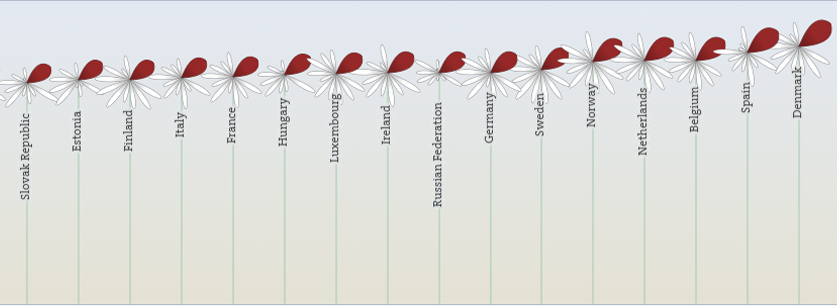Who works more and who plays more? Best countries for the work-life balance
Working long hours, fighting to meet deadlines, burning the midnight oil while trying to spend more time with the spouse and children or taking care of household activities can become overwhelming for the 21st century worker. A faulty work-life balance mainly affects family life, but it can negatively mirror work productivity as well, once burnout sets in.
By virtue of this aspect’s importance, the Organization for Economic Cooperation and Development (OECD) has ranked 34 member countries based on their work-life balance.
The ranking was developed by using two indicators, namely: Time devoted to leisure and personal care (defined by OECD as “average number of minutes per day spent on leisure and personal care, including sleeping and eating”) and Employees working very long hours (“percentage of employees working more than fifty hours a week on average, 2012 or latest available year”).
The best and worst countries in terms of work-life balance
On a scale from 0 to 10, the highest score was obtained by Denmark (9.8), closely followed by Spain (9.4), Belgium and Netherlands (8.8) and Norway (8.7). Other countries that had a high score were Russian Federation, Germany and Sweden. Turkey got the lowest score (0.0), followed by Mexico (2.6), Korea (4.2), Israel (4.9) and Chile (5.1). Countries such as Australia, USA, Canada or UK are also placed in the inferior half of the ranking.
Who does most of the unpaid work?
According to OECD, people spend one-tenth to one-fifth of their time doing unpaid work. In this matter, the assessed countries face some gender related differences. More specifically, men are more likely to spend hours engaged in paid work, while women spend more hours in unpaid, domestic work. If the average man spends 141 minutes per day doing unpaid work, the average woman spends 273 minutes per day engaged in cooking, cleaning and caring activities.
Who burns the midnight oil and what can go wrong?
As showed in the OECD study, a very important aspect related to work-life balance is the number of hours spent at work. In the OECD countries, not many employees work more than 50 hours a week. However, there are some nations with a high percentage of employees who work long hours, such as Turkey (43%) and Mexico (29%). When it comes to gender balance, 12% of men across OECD work long hours, compared to less than 5% of women.
Extensive research has been conducted on the effects of working long hours on the human body, and the results sustain the need for a better work-life balance. For example, an article published by the American Journal of Epidemiology concluded that working more than 8 hours a day increases the risk of coronary heart disease by 40 up to 80 percent.
It’s high time you spent more you-time!
The more one works, the less time he or she devotes to personal care or leisure. Needless to say, devoting time to recreational activities becomes very important for one’s health. According to a National Cancer Institute (NIH) study quoted by ScienceDaily, leisure-time physical activity, even at relatively low levels of activity, is associated with longer life expectancy.
The full-time worker in the OECD works 1,765 hours a year. 62% of the day (close to 15 hours) are spent, on average, on personal care (sleeping and eating) and on leisure (socializing, hobbies, games, computer etc.).
What can you do to achieve a better work-life balance?
Finding a proper balance between work and personal life is essential. It influences physical and psychological health and, consequently, it affects performance at work. Some simple steps can be followed in order to improve your work-life balance:
- Do your best within working hours;
- Prioritize your work;
- Create a schedule which includes daily leisure time and stick with it;
- Clarify your personal vision and goals and eliminate all unnecessary activities.
Improving the work-life balance will help you perform better both within and outside working hours. You will increase performance at work by delivering the good and timely outputs expected from you, by maintaining a high level of engagement towards your organization and by continuously improving your abilities and skills. Outside working hours you will improve performance by not ignoring your family and dedicating time to your health and hobbies.
References:
- OECD (n.d.), Work-Life Balance
- Virtanen, M., Heikkilä, K., Jokela, M., Ferrie, J.E., Batty, G.D.,, Vahtera, J., Kivimäki M. (2012), Long Working Hours and Coronary Heart Disease: A Systematic Review and Meta-Analysis, American Journal of Epidemiology
- NIH/National Cancer Institute (2012), Leisure-time physical activity extends life expectancy as much as 4.5 years, ScienceDaily
Image Sources:

Tags: Personal performance, Work-life balance









